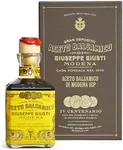Buying Guide for the Best Balsamic Vinegars
Choosing the right balsamic vinegar can greatly enhance your culinary experience. Balsamic vinegar is a versatile condiment that can be used in salads, marinades, sauces, and even desserts. When selecting balsamic vinegar, it's important to understand the different types and key specifications that can affect its flavor, quality, and usage. Here are some key aspects to consider when picking the best balsamic vinegar for your needs.AgeThe age of balsamic vinegar is a crucial factor that influences its flavor and quality. Traditional balsamic vinegars are aged for a minimum of 12 years, while some can be aged for up to 25 years or more. The longer the aging process, the thicker, sweeter, and more complex the flavor becomes. Younger balsamic vinegars (less than 12 years) tend to be more acidic and less sweet. If you prefer a richer, more nuanced flavor, opt for an older vinegar. For everyday use in salads and marinades, a younger vinegar may be more suitable.
IngredientsHigh-quality balsamic vinegar should contain only grape must (cooked grape juice) and wine vinegar. Some commercial balsamic vinegars may include additional ingredients like caramel, thickeners, or preservatives. These additives can affect the taste and authenticity of the vinegar. For the best flavor and health benefits, choose a balsamic vinegar with a short and simple ingredient list.
Acidity LevelThe acidity level of balsamic vinegar is typically around 6%, but it can vary. Higher acidity levels result in a sharper, more tangy flavor, while lower acidity levels produce a smoother, sweeter taste. Consider your personal preference and the intended use of the vinegar. For drizzling over desserts or using in delicate dishes, a lower acidity vinegar may be preferable. For salads and marinades, a higher acidity vinegar can add a pleasant tang.
ConsistencyThe consistency of balsamic vinegar can range from thin and watery to thick and syrupy. This is often a result of the aging process and the concentration of the grape must. Thicker vinegars are typically more aged and have a more intense, sweet flavor, making them ideal for drizzling over dishes as a finishing touch. Thinner vinegars are better suited for mixing into dressings and marinades. Choose a consistency that matches your culinary needs and preferences.
CertificationAuthentic traditional balsamic vinegar from Modena or Reggio Emilia in Italy is protected by the DOP (Denominazione di Origine Protetta) certification. This certification ensures that the vinegar is produced according to strict traditional methods and standards. Look for the DOP label to ensure you are getting a genuine product. If authenticity and traditional quality are important to you, opt for a certified balsamic vinegar.















